
Comiskey Park was a baseball park in Chicago, Illinois, located in the Armour Square neighborhood on the near-southwest side of the city. The stadium served as the home of the Chicago White Sox of the American League from 1910 through 1990. Built by White Sox owner Charles Comiskey and designed by Zachary Taylor Davis, Comiskey Park hosted four World Series and more than 6,000 Major League Baseball games. Also, in one of the most famous boxing matches in history, the field was the site of the 1937 heavyweight title match in which Joe Louis defeated then champion James J. Braddock in eight rounds that launched Louis' unprecedented 11-plus year run as the heavyweight champion of the world.
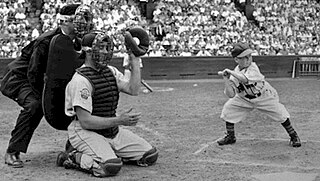
Edward Carl Gaedel was the smallest player to appear in a Major League Baseball game.

William Louis Veeck Jr., also known as "Sport Shirt Bill" and "Wild Bill" was an American Major League Baseball franchise owner and promoter. Veeck was at various times the owner of the Cleveland Indians, the St. Louis Browns, and the Chicago White Sox. As owner and team president of the Indians in 1947, Veeck signed Larry Doby, thus beginning the integration of the American League, and the following year won a World Series title.
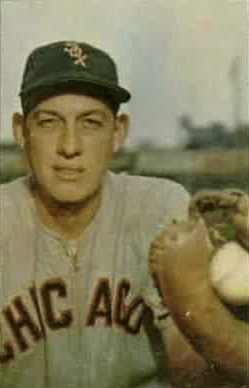
John Sherman Lollar Jr. was an American professional baseball player and coach. He played for 18 seasons as a catcher in Major League Baseball (MLB) for the Cleveland Indians (1946), New York Yankees (1947–1948), St. Louis Browns (1949–1951), and Chicago White Sox (1952–1963).
The 1959 World Series featured the National League champion Los Angeles Dodgers beating the American League champion Chicago White Sox, 4–2. Each of the three games played at the Los Angeles Memorial Coliseum drew record crowds, Game 5's attendance of 92,706 continues to be a World Series record to this day, and one that cannot feasibly be broken in any modern ballpark.

William Orville DeWitt Sr. was an American professional baseball executive and club owner whose career in Major League Baseball (MLB) spanned more than 60 years. DeWitt held multiple ownership and upper management positions in the major leagues, including general manager and owner of both the St. Louis Browns and Cincinnati Reds, chairman of the board of the Chicago White Sox, and president of the Detroit Tigers.
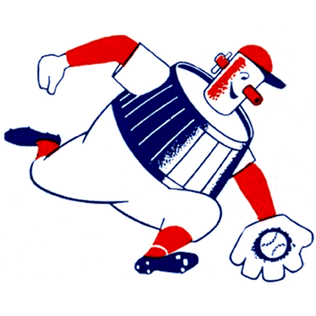
The Milwaukee Brewers were a minor league baseball team based in Milwaukee, Wisconsin. They played in the American Association from 1902 through 1952. The 1944 and 1952 Brewers were recognized as being among the 100 greatest minor league teams of all time.

James Wren "Zack" Taylor was an American professional baseball player, coach, scout and manager. He played in Major League Baseball as a catcher with the Brooklyn Robins, Boston Braves, New York Giants, Chicago Cubs, New York Yankees, and again with the Brooklyn Dodgers. Although Taylor was not a powerful hitter, he sustained a lengthy career in the major leagues due to his valuable defensive abilities as a catcher. After his playing career, he became better known as the manager for the St. Louis Browns owned by Bill Veeck. His baseball career spanned 58 years.

Clinton Dawson Courtney, nicknamed Scrap Iron, was an American professional baseball catcher who played in Major League Baseball (MLB) for the New York Yankees (1951), St. Louis Browns / Baltimore Orioles, Chicago White Sox (1955), Washington Senators (1955–1959) and Kansas City Athletics (1961). He batted left-handed and threw right-handed.
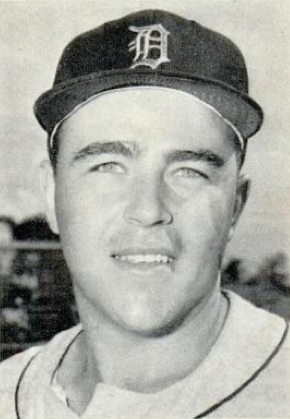
Ned Franklin Garver was an American professional baseball pitcher. He played in Major League Baseball (MLB) for the St. Louis Browns (1948–1952), the Detroit Tigers (1952–1956), the Kansas City Athletics (1957–1960), and the Los Angeles Angels (1961). Garver and Irv Young are the only pitchers in the modern era of baseball to win 20 or more games for a team that lost 100 games.
The Chicago White Sox are a Major League Baseball team based on the South Side of Chicago. They are one of eight charter members of the American League, having played in Chicago since the inaugural 1901 season. They have won six American League pennants and three World Series titles, most recently in 2005.
The 1952 St. Louis Browns season was a season in American baseball. It involved the Browns finishing 7th in the American League with a record of 64 wins and 90 losses. This was the franchise's penultimate season in St. Louis.
The 1951 St. Louis Browns season involved the Browns finishing 8th in the American League with a record of 52 wins, and 102 losses.
The 1948 Cleveland Indians season was the 48th in franchise history. When the regular season resulted in a first place tie, the Indians won a one-game playoff against the Boston Red Sox to advance to the World Series. Cleveland won the championship by defeating the Boston Braves 4 games to 2 for their first World Series win in 28 years. The Sporting News ranked the 1948 Indians the 9th-best team ever.
The 1991 Major League Baseball season saw the Minnesota Twins defeat the Atlanta Braves for the World Series title, in a series where every game was won by the home team.
The 1960 Major League Baseball season was played from April 12 to October 13, 1960. It was the final season contested by 16 clubs and the final season that a 154-game schedule was played in both the American League and the National League. The AL began using the 162-game schedule the following season, with the NL following suit in 1962.

The 1886 World Series was won by the St. Louis Browns of the American Association over the Chicago White Stockings of the National League, four games to two. The series was played on six consecutive days running from October 18 to October 23 in Chicago and St. Louis.
Edward Redys was a Minor League Baseball player and Major League Baseball coach.
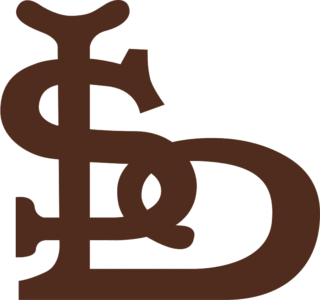
The St. Louis Browns were a Major League Baseball team that originated in Milwaukee, Wisconsin, as the Milwaukee Brewers. A charter member of the American League (AL), the Brewers moved to St. Louis, Missouri, after the 1901 season, where they played for 52 years as the St. Louis Browns.










